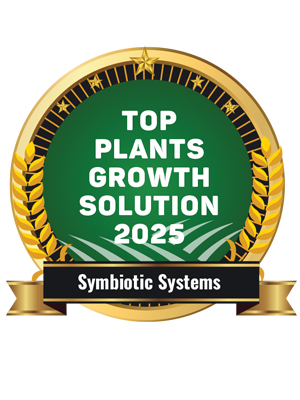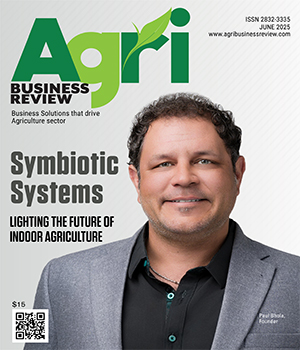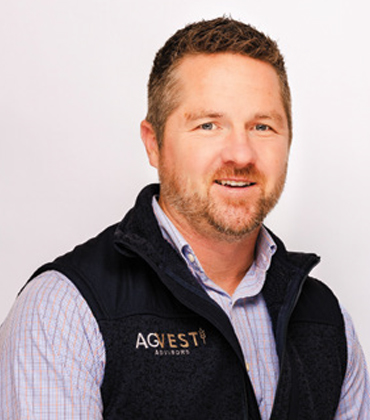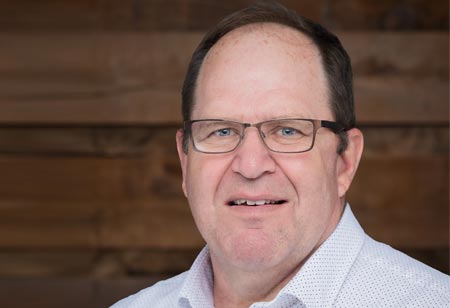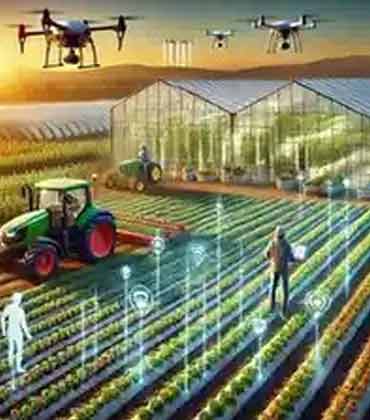Thank you for Subscribing to Agri Business Review Weekly Brief
Agri Business Review: Specials Magazine
Indoor farming has long promised a revolutionary approach to agriculture, offering controlled environments for growing crops regardless of weather or climate. However, the industry has been hindered by outdated lighting systems that rely on broad-spectrum illumination, attempting to replicate natural sunlight rather than optimizing for plant biology. Traditional high-pressure sodium (HPS) and full-spectrum LED systems waste energy by emitting wavelengths that plants either don’t use efficiently or actively filter out. These systems fail to account for the fact that plants don’t require uniform light exposure but instead respond to specific wavelengths at different growth stages. Symbiotic Systems, founded by Paul Bhola, is pioneering an adaptive lighting technology that uses narrowband LED systems to specifically stimulate plant responses. With patented dynamic lighting and AI-driven controls, Symbiotic Systems enhances yield, reduces operational costs, and improves crop quality by stimulating the plants to produce using the plant’s own growth systems.. “Plants don’t just need light. They need the right signals at the right time. What we are doing is providing them with a language they understand,” says Bhola. This approach ensures that plants receive the exact wavelengths required for optimal growth and compound production. Independent studies have validated this technology, demonstrating up to a fivefold increase in medicinal compound yields. From Discovery to Revolutionary Technology Symbiotic Systems' journey began in 2008–2009 when Bhola was developing infrastructure for large-scale resorts in Latin America. Faced with the challenge of providing consistent food and water supplies to remote locations, he explored indoor agriculture. However, he found traditional methods inefficient, largely due to lighting systems designed to replicate sunlight rather than cater to plants' natural adaptability.
High-Level Farmland Investment Company 2025
Farmland is a high-potential asset class—stable, lucrative and essential. But the some of the best deals never hit the market, trading within tight-knit farming communities and leaving most investors locked out. AgVest Advisors breaks this barrier by pairing deep agricultural expertise with an extensive nationwide network of landowners, farmers and industry insiders to unlock exclusive investment opportunities. Led by industry veteran Chris Brawner, who has managed more than $900 million in farmland investments, AgVest identifies off-market deals before they become publicly available. Its direct investment model eliminates rigid fund structures and excessive fees, giving investors greater access, flexibility and the ability to build future-ready portfolios. "Farmland investing works best when investors have direct access and control. We make sure every dollar goes toward acquiring high-quality assets and not administrative overhead," says Brawner, founder and president. Rather than locking capital into blind pool funds with high upfront fees and rigid timelines, AgVest offers direct access to premium farmland investments. Investors pay only when capital is deployed, eliminating fees on idle funds and ensuring that returns are tied to actual investment performance, not just commitments. AgVest empowers investors with strategic control and the freedom to capitalize on market timing. Unlike typical farmland funds that can charge up to 1–2 percent on committed capital before any land is acquired and requires forced sales within fixed timelines, AgVest allows assets to be held indefinitely. This approach avoids pressure to sell during market downturns and maximizes long-term value. AgVest only earns when investments perform, ensuring its interests are fully aligned with investor success. AgVest’s deep agricultural expertise and strong local presence bring clarity to a complex asset class. In every region in which it operates, the firm partners with seasoned farm managers, each with over 20 years of experience, who offer firsthand insights into soil health, crop trends, tenant relationships and regional dynamics. This boots-on-the-ground approach enables AgVest to map out farms, identify ready-to-go tenants and analyze lease rates and ownership specifics. For institutional investors unfamiliar with these nuances, AgVest simplifies the process, providing the knowledge required to make confident, well-informed decisions while minimizing risk and maximizing the long-term potential of investment. Every strategy is customized to fit the investor’s goals. AgVest begins by assessing risk tolerance, return expectations and geographic preferences, then sources and underwrites investments accordingly. Its comprehensive process includes tenant vetting, soil and water analysis, lease rate benchmarking, multi-year cash flow modeling and long-term valuation projections. This tailored, data-driven approach ensures every deal is both profitable and resilient..
Agri Credit and Insurance Service 2025
Success in farming and ranching across the Midwest’s vast agricultural heartland depends on trusted financial partners who understand the unique challenges of rural businesses. Farm Credit Services of America (FCSAmerica) exemplifies this commitment, offering more than just financial products—a collaborative partnership rooted in shared values and mutual success. Headquartered in Omaha, Nebraska, FCSAmerica operates as a customer-owned cooperative serving Iowa, Nebraska, South Dakota, and Wyoming. The cooperative’s mission is deeply rooted in agriculture, offering credit and financial services tailored to meet the evolving needs of farmers, ranchers, and agribusinesses. Unlike conventional lenders, FCSAmerica returns its earnings to the very customers it serves, fostering a unique model of shared ownership and mutual benefit. FCSAmerica is not a traditional bank; it exists solely to serve those who grow the nation's food, fiber, and fuel. Consequently, it provides them with strategic tools and a deep bench of expertise— key ingredients in helping rural America flourish. A Cooperative Framework Delivering Tangible Benefits FCSAmerica's distinctive cooperative model, where customers are also stakeholders, is central to its success. This structure ensures alignment between the organization’s financial performance and the interests of its members, cultivating a partnership based on trust and shared objectives. One of the clearest manifestations of this model is the cooperative’s cash-back dividend program, which returned approximately 392.6 million dollars to customer-owners in 2024 alone. This dividend effectively reduces borrowing costs, reinforcing the financial advantages of membership. FCSAmerica offers a broad range of financial products designed with the agricultural community in mind. From operating loans and land acquisition financing to equipment leases and facility construction loans, the cooperative provides flexible, competitively priced options that accommodate the diverse needs of its clientele. Customers also benefit from crop insurance solutions and risk management tools, all consolidated within a single institution dedicated exclusively to agriculture. Personalized service remains a hallmark of FCSAmerica. Local offices staffed by financial professionals in its communities offer clients an intimate understanding of regional challenges and opportunities, fostering enduring relationships grounded in knowledge and trust.
CXO INSIGHTS
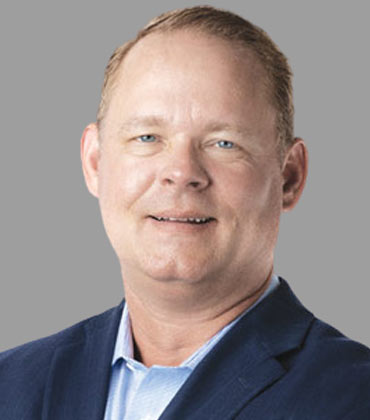
Six Sigmas Impact on the Agriculture Industry
Robert King, Executive Vice President (& President), Crop Protection Business, Corteva Agriscience

Simplicity at Soli Organic is the Key to Scale
Steven Grimes, Head of Equipment and Technology, Soli Organic
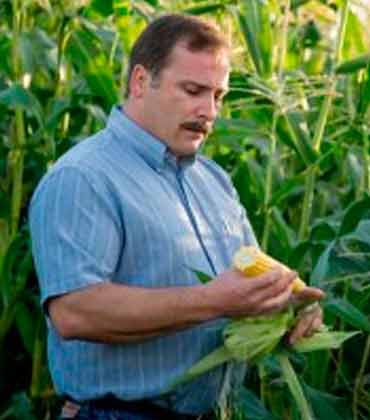
Advancing Agriculture: Sustainable Practices from the Field, to the Farm, to the Planet
Rich Burres, Director of Ag Sustainability, Lamb Weston

Cultivating Sustainability: The Vital Role of Farmers in Regenerative Agriculture
Michelle French, Senior Director of Global Sustainability Programs, ADM
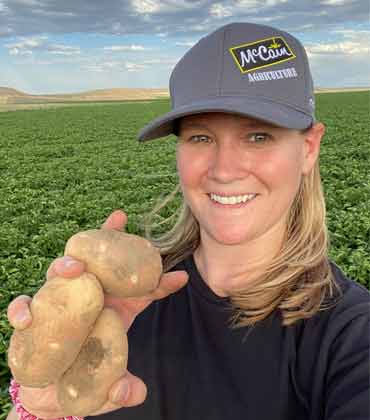
Potato Varieties: A Vision for 2030
Nicole Nichol, Director of Ag, Variety Development & Seed Supply, North America, McCain Foods
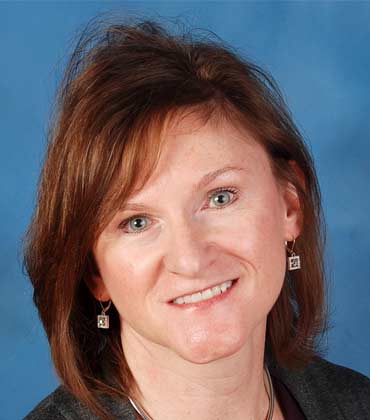
Improving Public Health Through Agriculture
Colleen M. Zammer, Vice President of Varietal Solutions Growth & Corporate Innovation, Bay State Milling Company
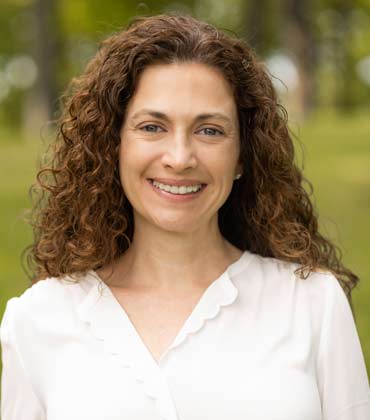
The Path to Sustainable Agriculture Through Collaboration and Innovation
Anna Pierce, Director of Sustainability, Tate & Lyle
IN FOCUS
The Global Shift in Plant Growth Solutions
Biostimulants encompass a diverse range of substances and microorganisms that enhance nutrient uptake, improve tolerance to abiotic stresses
EDITORIAL
Sustainability Driving the Future of US Farming
Across fields and orchards, precision farming is gaining ground. Using data analytics, GPS mapping, and smart sensors, farmers are learning to use water, fertilizer, and pesticides more efficiently. These tools help apply the right amount of input in the right place at the right time. The result is lower costs and less waste, along with a meaningful reduction in runoff and greenhouse gas emissions. It is a smarter way to farm, one that meets both economic and environmental goals.
In places like the Midwest and California’s Central Valley, growers are using soil moisture sensors and satellite imagery to track crop health in real time. This technology allows quick responses, preventing overwatering and reducing the loss of nutrients into rivers and lakes. It also helps farmers stay ahead of shifting weather, building resilience against droughts, floods, and other climate-related disruptions.
New developments in artificial intelligence are pushing these advances even further. Machine learning models can now sift through massive amounts of data to predict pest outbreaks, weather shifts, and future yields. With this insight, farmers can make faster and better decisions, improving both efficiency and sustainability.
What is emerging is a more balanced future for U.S. agriculture. One that supports strong harvests without compromising the land or the environment. Through innovation and stewardship, American farmers are proving that productivity and sustainability can grow side by side.
In this edition, we feature insights from Paul Bonnett, Senior Director of Agronomy & Environmental Sciences (AES), Nutrien Ag Solutions, and Dave Hyde, Agriculture Sustainability Manager, JR Simplot Global Food Group. They share their views on how precision farming is reshaping US agriculture, sharing perspectives on integrating agronomy expertise with cutting-edge sustainability strategies to drive long-term success.

